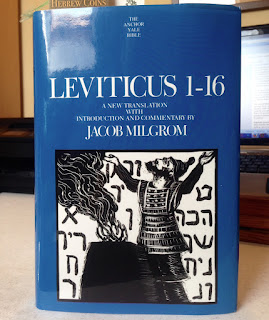Adventures in Sacrifices, with Jacob Milgrom - Torah portion Vayikra

I recently discovered the Anchor Yale Bible series, and from the tiny fraction of it I've read thus far (some Exodus, some Leviticus), it's already become my new favorite commentary on the Torah. The Leviticus section is written by Jacob Milgrom, the late (d. 2010) Bible scholar and long-time head of the Near Eastern Studies department at U.C. Berkeley. He devoted much of his academic career to studying Biblical purity laws and the sacrificial system, and many of his findings and conclusions are distilled within this masterpiece on Leviticus, a monster 2,700-page work in three volumes (the bibliography alone is 60 pages, just to give you an idea), which combines Biblical scholarship with traditional rabbinic/Talmudic material and classical Medieval Torah commentaries. To say the work is dense is an understatement. It goes through every word of the Masoretic Text, followed by longer commentaries on selected topics. So what I'd like to do, as we foray into the third bo...



